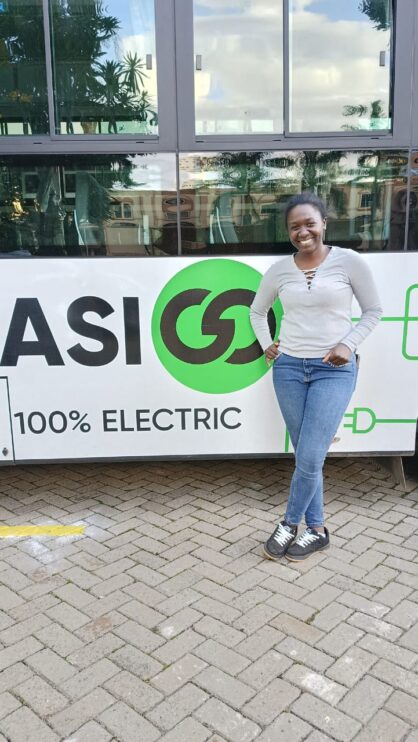Breaking Barriers: My Journey as a Young Female Electric Bus Mechanic in Kenya
Growing up, I always had a passion for machines, a curiosity about how things worked, and a desire to fix them when they didn’t. Today, I find myself living that passion as a young female auto electrician specializing in electric buses at BasiGo. Working in Kenya’s emerging electric vehicle (EV) industry is both exciting and challenging, but it’s a journey that I wouldn’t trade for anything.
The Impact of My Work
Electric mobility is the future, and I’m proud to be part of a movement that is shaping Kenya’s transportation industry. Every day, I work on electric buses, ensuring they run efficiently and safely. This isn’t just about fixing buses—it’s about contributing to a cleaner environment, reducing carbon emissions, and advancing sustainable mobility in our cities. Knowing that my work directly supports Kenya’s transition to green energy motivates me to keep learning and pushing forward.
Beyond the technical work, I also see my presence in this field as a statement. In an industry largely dominated by men, being a young woman in the EV sector challenges stereotypes and inspires other young ladies to explore careers in engineering and mechanics. Representation matters, and I hope my journey encourages more women to join the field.
I have witnessed firsthand how electric buses are changing Kenya’s urban transport landscape. These buses reduce reliance on fossil fuels and lower the cost of operations for transport companies, ultimately benefiting commuters with cleaner and more efficient transport options. It is fulfilling to be part of a workforce that is not only maintaining these vehicles but also ensuring their long-term success in Kenya.
Challenges in the Industry
Of course, this path is not without its obstacles. One of the biggest challenges is the perception that mechanical work is a man’s job. Many people are surprised to see a woman in overalls working on electric buses, and sometimes, I have to work twice as hard to prove my skills and earn respect. The assumption that women are not physically strong enough for mechanical work is outdated, but it still lingers in many workplaces. It has taken determination, resilience, and a strong belief in my abilities to overcome these biases.
Another challenge is the evolving nature of EV technology. Unlike traditional diesel or petrol vehicles, electric buses require a deep understanding of electrical systems, battery management, and high-voltage safety. Since the industry is still young in Kenya, access to advanced training and mentorship is limited. However, I embrace continuous learning and seek out every opportunity to upskill myself. I have taken courses, attended workshops, and connected with professionals in the EV industry to stay ahead of the latest advancements.
Additionally, infrastructure and resources for EV mechanics are still developing. Charging stations, spare parts, and specialized tools are not as widely available as they should be, making it challenging to keep the buses running smoothly. This means that troubleshooting and repairs often require creative problem-solving and resourcefulness. Sometimes, delays in sourcing parts or technical support can slow down operations, adding another layer of complexity to the job.
Support and Mentorship
Despite these challenges, I have been fortunate to find support in various ways. At BasiGo, I work alongside professionals who are committed to the growth of the EV sector. I have also found mentorship in experienced technicians who have guided me in improving my technical skills and gaining confidence in my work.
The power of mentorship cannot be underestimated. Having role models and industry experts who believe in my abilities has made a significant difference in my journey. I make it a priority to share my experiences with other young women interested in automotive engineering, offering guidance and encouragement whenever possible. I want to create a pathway for more women to thrive in this industry, ensuring they have the support and resources they need to succeed.
Looking Ahead
Despite the hurdles, I remain optimistic. Kenya’s EV industry is growing, and I believe more opportunities will open up for young mechanics like myself. My goal is to continue mastering my craft, mentor other young women interested in electric mobility, and contribute to making EV technology more accessible in Kenya.
In the future, I hope to see more investment in training programs for EV technicians, stronger policies supporting electric mobility, and a shift in cultural perceptions about women in technical fields. As the demand for electric vehicles increases, there will be a greater need for skilled professionals to maintain and service these vehicles. This presents an opportunity for young people to enter the field and shape the future of transportation in Kenya.
To young women who are considering a career in engineering or mechanics, I say: Don’t be afraid to step into this space. Your skills, intelligence, and passion are needed. The road may be tough, but the impact is worth it. Believe in yourself, seek mentorship, and never stop learning.
The future of transportation is electric, and I am honoured to be part of this revolution.
